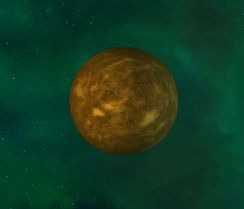
|
This wiki is closed in favour of the new wiki. Information shown is likely to be very out of date. |
Difference between revisions of "Planet Pygar"
m (New Infcard from the NavMap and links added) |
(Category removed. pic file fixed) |
||
| Line 1: | Line 1: | ||
| − | {{Version|4. | + | {{Version|4.91}} |
{{Planet Infobox | {{Planet Infobox | ||
| name = Planet Pygar | | name = Planet Pygar | ||
| − | | image = Pygar.jpg | + | | image = Planet Pygar.jpg |
| owner = | | owner = | ||
| system = [[Omicron Theta]] | | system = [[Omicron Theta]] | ||
| Line 18: | Line 18: | ||
Pygar has since then been visited a number of times by other, more cautious science teams. The Nomad infections that triggered the Nomad war were traced back to Pygar, but subsequent searches showed the alien city devoid of any activity. The Nomads had left, and taken whatever technology was left on Pygar, with them. Surface conditions remain extremely hazardous, and it can be months before a window opens in the atmosphere for ships to safely land or lift off. Still, the chance of unlocking alien secrets is a major draw to xenoarcheologists, and the planet can have as many as 2.000 people investigating it's ruins at any given time. | Pygar has since then been visited a number of times by other, more cautious science teams. The Nomad infections that triggered the Nomad war were traced back to Pygar, but subsequent searches showed the alien city devoid of any activity. The Nomads had left, and taken whatever technology was left on Pygar, with them. Surface conditions remain extremely hazardous, and it can be months before a window opens in the atmosphere for ships to safely land or lift off. Still, the chance of unlocking alien secrets is a major draw to xenoarcheologists, and the planet can have as many as 2.000 people investigating it's ruins at any given time. | ||
| + | |||
[[Category: Edge Worlds]] | [[Category: Edge Worlds]] | ||
| − | |||
Revision as of 19:53, 10 December 2018
| Planet Pygar | |
| Location | 4C, Omicron Theta Edge Worlds |
| Technical information | |
| Docking | No |
| Terrain | Desert |
| Diameter | 4,821 km |
| Mass | 3.17 x 10e24 kg |
| Temperature | -46°C to 34°C |
| Escape velocity | 5.56 km/sec |
A desert world scoured clean by ceaseless sandstorms that wash across its surface. During initial surveys, individual sandstorms that lasted for several years and reached top speeds of 805 km/h were observed. Most surface probes were destroyed in a matter of hours, but revealed the existance of unnatural rock formations buried beneath the sands. In 763 A.S. Rheinland, jealous of the massive technological advantage Liberty had over them through the Valhalla archives, dispatched a deep space survey team to the planet to uncover what secrets might lie beneath the raging sands. They found something unexpected: An underground city, perfectly preserved, with a trove of alien technologies - some of which were alive. Curiosity turned to carelessness, and some chambers that should have stayed sealed, were opened. The Nomads, as they later came to known, awoke from their stasis and were quick to overwhelm and subvert the science teams. After learning from their memories what had happened in the past centuries, they return to Rheinland with them with a wealth of artifacts, data, and other Nomads, masquerading as a highly successful expedition. This set events in motion that would later trigger the Nomad War.
Pygar has since then been visited a number of times by other, more cautious science teams. The Nomad infections that triggered the Nomad war were traced back to Pygar, but subsequent searches showed the alien city devoid of any activity. The Nomads had left, and taken whatever technology was left on Pygar, with them. Surface conditions remain extremely hazardous, and it can be months before a window opens in the atmosphere for ships to safely land or lift off. Still, the chance of unlocking alien secrets is a major draw to xenoarcheologists, and the planet can have as many as 2.000 people investigating it's ruins at any given time.
